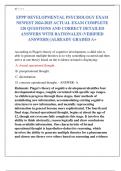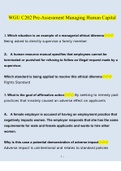Exam (elaborations)
EPPP DEVELOPMENTAL PSYCHOLOGY EXAM NEWEST ACTUAL EXAM COMPLETE 120 QUESTIONS AND CORRECT DETAILED ANSWERS WITH RATIONALES (VERIFIED ANSWERS) |ALREADY GRADED A+
Course
EPPP DEVELOPMENTAL PSYCHOLOGY
Institution
EPPP DEVELOPMENTAL PSYCHOLOGY
EPPP DEVELOPMENTAL PSYCHOLOGY EXAM
NEWEST ACTUAL EXAM COMPLETE
120 QUESTIONS AND CORRECT DETAILED
ANSWERS WITH RATIONALES (VERIFIED
ANSWERS) |ALREADY GRADED A+
[Show more]
Preview 4 out of 88 pages
Uploaded on
July 17, 2024
Number of pages
88
Written in
2023/2024
Type
Exam (elaborations)
Contains
Questions & answers
eppp developmental eppp developmental psychology exam newest 2024 20
eppp developmental psychology
eppp developmental psychology exam
Institution
EPPP DEVELOPMENTAL PSYCHOLOGY
Course
EPPP DEVELOPMENTAL PSYCHOLOGY
$28.49
100% satisfaction guarantee
Immediately available after payment
Both online and in PDF
No strings attached
1 | P a g e EPPP DEVELOPMENTAL PSYCHOLOGY EXAM NEWEST 2024 -2025 ACTUAL EXAM COMPLETE 120 QUESTIONS AND CORRECT DETAILED ANSWERS WITH RATIONALES (VERIFIED ANSWERS) |ALREADY GRADED A+ According to Piaget's theory of cognitive development, a child who is able to generate multiple theories as to why something occurred and then arrive at one theory based on the evidence at hand is displaying: A. formal operational thought. B. preoperational thought. C. decentration. D. concrete operational thought. - ANSWER - A. Rationale : Piaget's theory of cognitive development identifies four developmental stages, roughly correlated with specific age ranges. As children progress through these stages, their methods of assimilating new information, accommodating existing cognitive structure s to new information, and mentally representing information in general become more sophisticated. The fourth and final stage, formal operational thought, begins at about the age of 12, though not everyone fully completes this stage. It involves the ability to think abstractly, reason logically and draw conclusions from available information. One characteristic of formal operational thought is hypothetico -deductive reasoning, which involves the ability to generate multiple theories for a phenomenon and choos e one theory over others based on reasoning and evidence 2 | P a g e The effects of Fetal Alcohol Syndrome: A. are irreversible and long -term. B. remit within the first six months in about 25% of cases. C. are reversible if proper nutrition is provided to the child. D. remit by the age of six except for lingering learning difficulties. - ANSWER - A. Rationale : The term Fetal Alcohol Syndrome (FAS) refers to a set of severe and complex deficits in children produced by prolonged and heavy maternal alcohol use during pregnancy. Symptoms vary depending on the amount of alcohol consumed; typical features included gro wth retardation, microcephaly, irritability, and a variety of physical illnesses. In most cases, the symptoms are irreversible.© According to the concept of "homeostasis," if a married woman's depressive symptoms improve, we can expect that which of the following will be most likely to occur? A. increased support from her husband B. depressive symptoms in her husband C. rejection by all family members D. overall improvement in the family's symptoms - ANSWER - B. Rationale : "Homeostasis" refers to the tendency for any system to react toward restoring the status quo in the event of any change. Homeostasis is automatically disturbed as individuals in a family grow into new developmental stages or "get better" after having had d epressive or other symptoms. Therefore, when someone recovers, to restore a homeostatic balance, family members may 3 | P a g e either sabotage the recovered member's improvement or become symptomatic themselves. Thus, if the woman's depressive symptoms improve, the concept of homeostasis would predict that depressive symptoms might develop in her husband Piaget believed that children are "spontaneous liars" and considered their false statements to be natural and harmless until about: A. Age 3 or 4 B. Age 4 or 5 C. Age 5 or 6 D. Age 7 or 8 - ANSWER - D. Rationale : Piaget thought that around age 7 or 8 children begin to intentionally communicate false statements. Subsequent research suggest that children as young as age four lie intentionally, most often to avoid punishment or obtain a reward. All of the following are true regarding the relationship between aging and memory, except: A. observed age -related cognitive and memory declines are believed to be due to artifacts of intelligence tests and experience, rather than physiological changes. B. the main locus of observed age -related decline in memory is in long -





